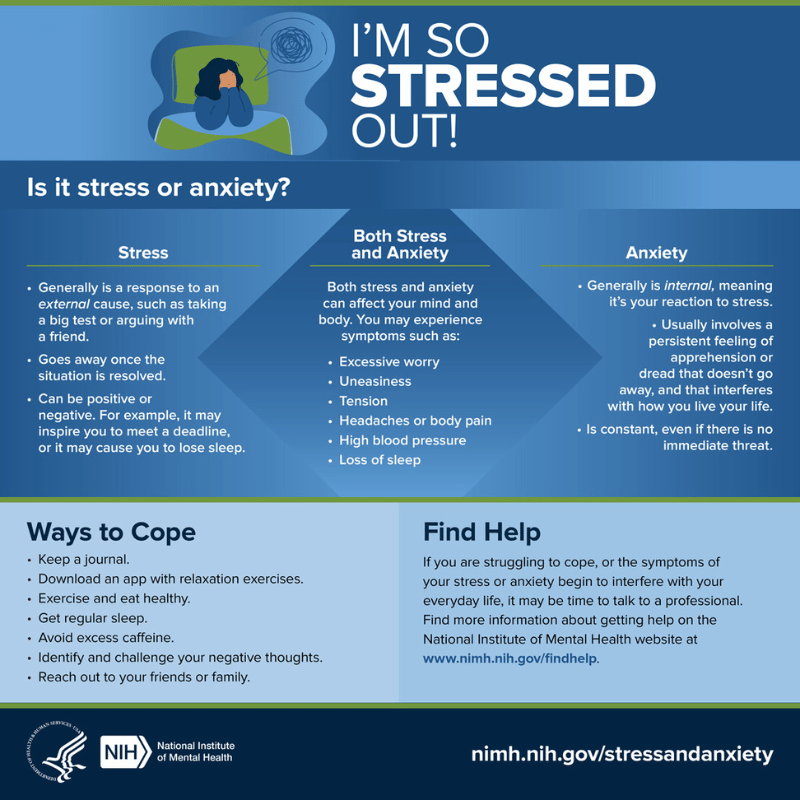Is The Anxiety Temporary? Red Flags and When To Seek Help

Anna’s alarm goes off at 6:30 AM. She glances at her phone and feels knots in her stomach. Today, she’ll walk into her new college dorm, surrounded by unfamiliar faces. It reminds her of her father, Mike, recounting his nervousness on his first day at a new job a year ago.
Across town, her younger brother, Dylan, 15, is also stirring. The impending start to high school has kept him awake many nights. He remembers when his mother, Sarah, shared stories about meeting new friends after their family’s move, trying to find her place.
For both Anna and Dylan, the anxiety associated with new beginnings isn’t unique, but a rite of passage that many students, like their parents before them, undergo. In fact, fear and anxiety is a normal part of life.
As the fall semester approaches, the anxiety about returning to school can increase for many students. Since anxiety is a normal part of life, when is anxiety about returning to school a cause for concern?
Recognizing Red Flags
Back To School Anxiety, What To Watch Out For
Distress can manifest differently in teens and college students. Both parents and educators play an important role in providing the necessary support during these transformative years.
Teens (12+)
- Mood Swings: Dramatic shifts in mood that are not typical for the teen
- Physical Complaints: Frequent complaints of headaches, stomachaches, or other physical issues, especially on school days
- Change in Sleep Patterns: Oversleeping, insomnia, or frequent nightmares
- Avoidance Behavior: An increased reluctance or refusal to attend school or engage in school-related activities
- Social Withdrawal: A sudden decrease in spending time with old friends or showing no interest in making new ones
- Decline in Academic Performance: A sudden drop in grades or disinterest in homework
- Increased Sensitivity: Easily upset, tearful, or agitated with minor provocations
- Behavioral Changes: Acts of aggression, lying, or defiance that are out of character
- Excessive Worry: Ongoing and pervasive concerns about schoolwork, friendships, or sports where they previously felt confident
College Students
- Intense Homesickness: Feeling consistently overwhelmed by the longing for home to the point where it’s hard to engage in college activities
- Isolation: Avoiding roommates, skipping classes, and staying away from communal areas like the cafeteria or library
- Chronic Fatigue: Despite getting enough sleep, feeling persistently tired or drained
- Change in Appetite: Significant weight loss or gain, skipping meals, or overeating
- Feelings of Hopelessness: Expressing persistent sadness, worthlessness, or talking about a lack of future
- Inability to Concentrate: Struggling with focus during lectures, studying, or even during leisure activities
- Excessive Absenteeism: Consistently missing classes or avoiding group study sessions
- Panic Attacks: Experiencing sudden episodes of intense fear with symptoms like rapid heartbeat, shortness of breath, or dizziness
- Risky Behaviors: Engaging in activities that they wouldn’t have considered before, like dangerous driving, excessive spending, or reckless social behavior
Telehealth Psychiatry For College Students
Is Back To School Anxiety Temporary?
Situational vs. Chronic Anxiety
Back-to-school anxiety can often be a natural response to a change in environment or routine, akin to how Sarah felt meeting new neighbors or Mike’s initial nervousness at a new job. This kind of anxiety is situational – it’s tied to specific events and usually fades as the individual adapts.
However, if the anxiety or distress lingers, becomes more intense, or starts to interfere with daily life, it might signal a deeper, more chronic issue. Learn more about recognizing depression and anxiety in children and teens.
Strategies to Alleviate Back to School Anxieties
Build Open Communication and Trust
Creating an environment where your child, teen, or college student feels comfortable expressing their emotions is important. Think back to a time when you faced a challenge – a tough day at work, or a misunderstanding with a friend. Now, recall the relief of talking to someone who just listened, without judgment or immediate solutions. Parents and caregivers can provide a safe space for teens and young adults who are struggling:
- Practice Active Listening: Focus entirely on your child when they speak. Avoid interrupting or immediately offering solutions. Instead, nod and give short verbal indications like “I see” or “Go on.”
- Create Healthy Routines: A regular sleep schedule, healthy diet, and having a dedicated time and space for homework and free time can help ease anxiety.
- Avoid Minimizing Feelings: Phrases like “It’s just a phase” or “You’ll get over it” can inadvertently dismiss their emotions. Instead, validate their feelings with responses like “That sounds tough” or “I can see why you’d feel that way.”
- Resist Judging: While you may not always understand or agree with their perspective, it’s crucial to create a space where they don’t fear criticism. Remember, it’s not about agreeing but understanding.
- Be Mindful of Exacerbating Your Teen’s Anxiety. Constantly checking in on homework or seeming visibly stressed about the school situation can signal to the teen or young adult that there’s something to be anxious about. On the other hand, showing trust in their abilities and offering a listening ear can be reassuring.
By creating space where they feel heard and understood, you help them navigate their feelings more effectively. It not only strengthens your bond but also equips them with the emotional tools to face challenges now and later.

Preparation, Routine, and Punctuality Is The Name Of The Game
Taking proactive steps to prepare for the new school year can significantly reduce back-to-school stress.
Completing tasks such as shopping for school supplies and sorting out back-to-school clothes well in advance of the first day of class can help students feel more in control. Additionally, punctuality plays a key role in setting a positive tone. Just as adults can feel frazzled or embarrassed when late to an important work meeting or appointment, being late can induce anxiety in students too.
Routines provide a sense of normalcy and predictability. Being late can disrupt one’s daily rhythm and the comfort that comes from having a predictable schedule. Being late often means rushing. This physical rush – like speeding, forgetting things, or not having time to eat breakfast – can elevate stress levels. For teens and college students, walking into a room late can create a feeling that all eyes are on them and increase self-consciousness and fear of judgment from teachers and peers.
Healthy Habits
Just like adults, students benefit from regular exercise, reducing or eliminating caffeine, meditation, adequate sleep, and a balanced diet.
When Seek Professional Help
If you notice consistent signs of anxiety or distress, declining grades, or social withdrawal it might be time to consider professional support.
Mental health issues often have their roots in childhood, manifesting as anxiety disorders, attention-deficit/hyperactivity disorder (ADHD), depression, mood disorders, eating disorders, or post-traumatic stress disorder (PTSD). In fact, 3 out of 4 adults with mental health problems showed signs before they were 24 years old.
Novum Psychiatry offers psychiatric evaluations for individuals aged 14+, ensuring comprehensive care for teens and young adults.
Our Experienced Team of Psychiatrists Can Help!
We know that taking the first step can be difficult.
Our highly-trained psychiatrists and therapists offer a comprehensive and confidential approach to private, outpatient psychiatric care. Whether this is your first time seeking psychiatric care or if you are seeking a new provider, Novum Psychiatry can help. In-person and telehealth appointments available. We accept health insurance.






